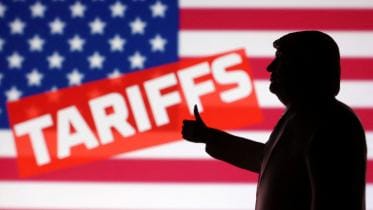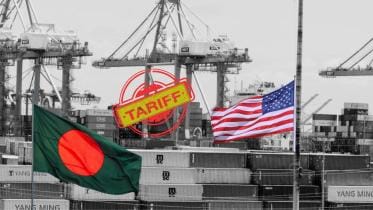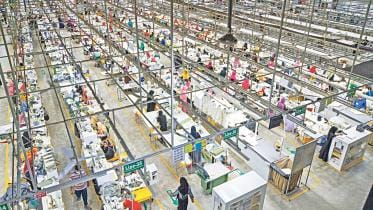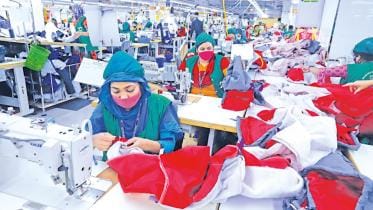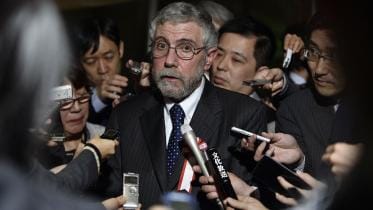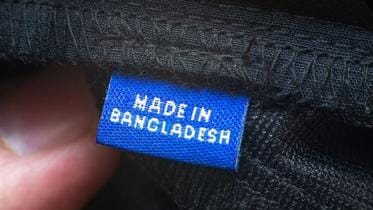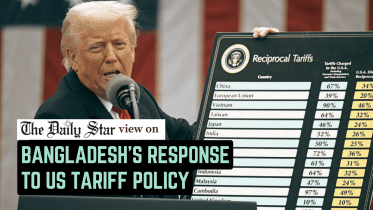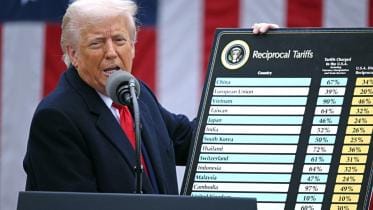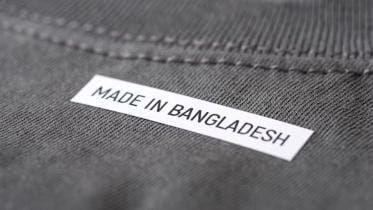US tariff impact on Bangladesh exports
Bangladesh risks $1.25b export loss to US over tariffs
RAPID study show
16 September 2025, 18:00 PM
Will Bangladesh benefit from higher US tariffs on China, India?
Bangladesh's garment industry sees potential in US tariff policy
3 September 2025, 18:00 PM
Tariff math favours Bangladesh in shifting US trade landscape
The shift of the USA to reciprocal tariffs has shaken global trade. But for Bangladesh, it’s opened a rare window of opportunity
8 August 2025, 18:00 PM
Bangladesh hopes to set sail stronger as US tariff kicks in
The new tariff on US-bound exports from Bangladesh came into effect yesterday, with hopes of maintaining a healthy flow of garment shipments to the American market.
7 August 2025, 18:35 PM
US reciprocal tariff taking effect tonight
The new 20 percent reciprocal tariff by the United States on Bangladeshi exports to the American market will come into effect tonight, which may open up opportunities for the country’s apparel sector as it adapts to evolving global trade dynamics.
6 August 2025, 18:00 PM
Bangladesh gains edge after US tariff cut
Trump admin has reduced tariffs on Bangladeshi goods from 35% to 20%, a move expected to strengthen the country’s competitiveness against rivals such as India and Vietnam
1 August 2025, 18:49 PM
US tariff hike ‘manageable’, Bangladesh remains competitive: BGMEA president
Here is the full text of his views on the new tariff
1 August 2025, 15:13 PM
Frustrated, businesses move to hire lobbyist to cushion US tariffs
Top business leaders have expressed frustration over the government’s progress in negotiations with the United States on reciprocal tariffs, saying they are now working to appoint a lobbyist on their own, though doubts remain about whether this last-ditch effort will succeed.
20 July 2025, 19:10 PM
Govt plans to include private sector in US tariff talks
Bangladesh is currently reviewing the proposals and will send a response within the next couple of days, Commerce Secretary Mahbubur Rahman told The Daily Star yesterday over the phone.
16 July 2025, 18:00 PM
Private sector sidelined in tariff talks
At a Star roundtable, industry leaders, trade experts slam govt’s handling of negotiations with US
15 July 2025, 18:10 PM
US tariff hike to shake entire economy, not just exports
A steep 35 percent tariff on Bangladeshi garment exports to the United States would affect far more than the country’s $8 billion annual shipments, according to economists and business leaders.
15 July 2025, 18:00 PM
Chattogram’s garment factories fear fallout from US tariffs
Owners of Chattogram-based readymade garment factories, many of which do business with buyers in the United States, are worried about a US tariff hike to 35 percent set to take effect on August 1.
14 July 2025, 18:00 PM
US sends list of items, seeking zero duty
The US has demanded zero duty facility for a large number of its products from Bangladesh.
13 July 2025, 18:17 PM
RMG sector on edge as tariff talks make no headway
The diverging outcomes threaten to create a multi-tiered tariff landscape in Asia, placing nations like Bangladesh at a serious disadvantage in the US market.
12 July 2025, 18:34 PM
US-China tariff war punishes Bangladesh
Bangladesh is facing pressure from Washington to decouple its manufacturing industries from Chinese suppliers, according to officials familiar with trade negotiations
9 July 2025, 18:07 PM
High tariffs on Bangladeshi clothes disruptive: Paul Krugman
There is a national security rationale for domestic production, but also for friendshoring and for nearshoring, because the stuff that's close by is a lot easier to secure, he says
8 April 2025, 06:25 AM
Some US RMG buyers want price cuts
The local suppliers are now trying to negotiate prices of garments under the new tariff regime
7 April 2025, 20:00 PM
Proper steps needed to address the US tariff crisis
Bold diplomacy, united efforts essential
7 April 2025, 14:30 PM
Dhaka confident of riding out tariff storm
Bangladeshi exporters remain optimistic about withstanding the Trump administration’s sweeping tariffs, hoping that bold diplomacy and a united front at home will shield them from the trade shock.
6 April 2025, 18:00 PM
Tariff twist leaves exporters on edge
A $100 shipment of T-shirts or jeans from Dhaka would face nearly $49 in import taxes at a US port, compared to just $11.56 now
5 April 2025, 18:01 PM



